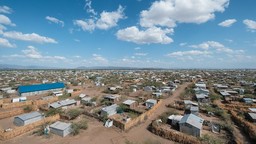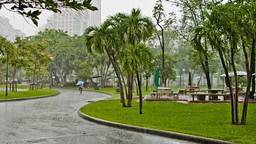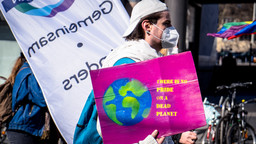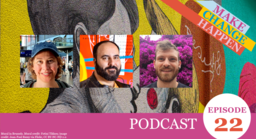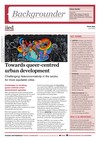What does queer have to do with it?
Mainstream development agendas ignore gender and sexual diversity. IIED is exploring how urban development and climate action can be more inclusive of LGBTQI+ communities and learn from queer thinking and practice.

Artists in Brazil combine protest with performance to highlight how state redevelopment projects such as the futuristic Museum of Tomorrow foments gentrification and displaces the urban poor in Rio de Janeiro. The performance is called 'Putas Maravilhas em Gentrificado' (Photo: copyright George Magaraia/Coletivo Seus Putos)
The sustainable development sector has made significant advances to champion social inclusion, equity and participatory processes.
For example, federations of the urban poor have collaborated to drive housing and infrastructure upgrading at scale; and we continue to see a groundswell of community organisations pioneering climate action in direct response to local needs.
However, mainstream sustainable development programmes and action-oriented research have struggled to consider gender and sexuality diversity.
Gender and sexual minorities – often referred to with the acronym LGBTQI+ (lesbian, gay, bisexual, transgender, queer, intersex and more) – face all the same development challenges as heterosexual and cisgender people (those whose gender identity matches the gender they were assigned at birth), but they also confront additional socioeconomic disadvantages as well as barriers to access support and care.
Due to prejudice and discrimination, they are excluded from local development and planning processes, and they are invisible in most government and research data.
Furthermore, in many countries homosexual and non-gender conforming behaviour is criminalised, often a legacy of penal codes imposed by colonial powers.
As a result, the World Bank estimates that gender and sexual minorities are disproportionately poor around the world. Particularly during humanitarian events, such as climate change-related disasters, LGBTQI+ people are more likely to have trouble accessing shelter and relief programmes.
Within the academic field of development studies, research focusing on sexual orientation, gender identity and expression, and sex characteristics (SOGIESC) has flourished since the start of the new century. But that knowledge remains niche and fragmented, and the discussion has yet to filter into the mainstream development and climate sectors.
Consequently, people with diverse SOGIESC are excluded from international development programming and climate action, which perpetuates the injustice they have faced historically.
We think the time is ripe for change.
What is IIED doing?
This exploratory project will make space for LGBTQI+ contributions to sustainable development and climate action by building bridges and identifying pathways for inclusion and impact. The three main objectives are to:
- Learn from LGBTQI+ community strategies and queer thinking to address the needs of climate-vulnerable populations and build just, sustainable cities
- Examine the ways organisations led by gender and sexual minorities are responding to their communities’ needs in the context of urban inequalities and climate change
- Explore how international civil society and action-research organisations can integrate gender and sexual diversity into their programmes and better support queer contributions to sustainable development and climate action, and
- Understand approaches for queering knowledge exchange in collaboration with queer activist organisations, and share learning practices with feminist practioners and donors.
Our approach will recognise that sexual orientation, gender identity and expression, and sex characteristics are complex and shaped by other identities and social markers such as race and ethnicity, physical ability, age, religion, and economic status.
Therefore, research and interventions should be intersectional, responding to overlapping and interlinked identities and inequalities.
After an initial scoping period we will convene a series of thematic dialogues with researchers, practitioners and civil society members to discuss topics such as urban informality, climate vulnerability, loss and damage, and forced migration through a queer lens. We will work closely to integrate gender and sexuality diversity into relevant projects and initiatives, such as IIED's project with SDI-Kenya to examine life for refugees and asylum seekers in Nairobi and IIED’s strategy on gender equality, intersectionality and justice.
We will also use creative practices such as creative writing and art to engage researchers and other stakeholders to reflect on how gender and sexuality shape our research and professional work.
We will pay particular attention to how donor organisations and international institutes such as IIED can affect flows of financial and material resources to support LGBTQI+ organisations in low and middle-income countries of the Majority World.
These organisations can and should participate in discussions related to solving the climate crisis and building sustainable and inclusive cities. We aim to:
- Develop the capacity of development researchers and practitioners to engage with queer thinking and consider gender and sexuality in sustainable development and climate actions. Similarly, we will contribute to the capacities of LGBTQI+ civil society to engage in policy debates concerning climate change and urban development
- Expand networks and partnerships by convening interested parties working across development and climate fields to discuss aligning development priorities with the rights and wellbeing of people with diverse SOGIESC, and
- Increase representation and visibility of LGBTQI+ research, professionals and priorities across development programming and policy discussions with outputs, events and participation in public forums.
